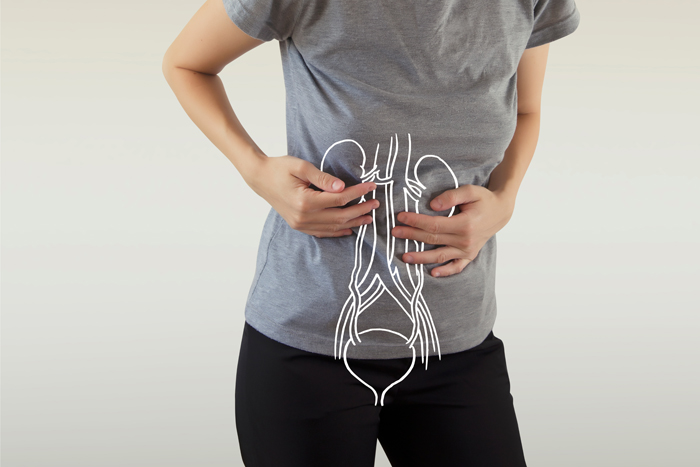Kidney Diseases Treatment & Diagnostics in Chembur, Mumbai
Kidney Diseases
Kidneys are bean-shaped organs that are found at the bottom of our rib cage. There is one on either side of your spine. The function of kidneys is to filter waste and excess fluids from your blood. These waste and excess fluids are then excreted from your body in the form of urine.
Kidney diseases are very common and affect a large population across the world. These can be chronic or acute and can be caused by different conditions.

What is a kidney disease?
Kidneys are very important body organs. Their main function is to filter blood, so that waste doesn’t accumulate in your body along with electrolytes. They also regulate the pH of your body as well as salt and potassium levels. Kidneys also produce hormones that help maintain red blood cells.
When the functioning of the kidney starts deteriorating, it is referred to as a kidney disease. Damage to the kidney might be caused by diabetes, high blood pressure or other chronic diseases. For further information, you should contact a kidney disease specialist near you.
What are the types of kidney diseases?
Chronic Kidney Disease
Chronic Kidney Disease or CKD is also known as Chronic Kidney Failure. In this case, the kidneys gradually lose their functions and are unable to filter your blood. Chronic Kidney Disease is extremely common in the world. About 9.1% of the global population suffer from Chronic Kidney Disease at some stage. In its later stages, it can be dangerous as high levels of waste can accumulate in the body. There is no particular cure for Chronic Kidney Disease, but treatment helps in slowing down the progression of the disease.
Kidney Stones
Kidney Stones are another very common kidney disease. This occurs when minerals or substances present in the blood crystallize in the kidney to form stones. These stones are usually passed out of the body during urination. Though they can be painful, they don’t cause many problems.
Glomerulonephritis
Glomerulonephritis refers to the inflammation of glomeruli. These glomeruli are extremely small structures inside the kidney that filter the blood. This can be caused by infection or by certain drugs. It often fixes itself.
Urinary Tract Infections (UTIs)
Urinary tract infections are bacterial infections that occur in the urinary system. These infections are more common in the urethra or the urinary bladder. These infections are easily treatable, but if left unchecked, can damage the kidney or even lead to kidney failure.
What are the common symptoms of kidney diseases?
Some common symptoms include:
- Nausea
- Vomiting
- Fatigue or weakness
- Loss of appetite
- Lack of concentration
- Troubled sleep or insomnia
- Need to urinate more often, especially at night
- Itchy or dry skin
- Muscle stiffness and cramps
- Anemia
When do you need to see a doctor?
If you experience any of the symptoms mentioned above, you should contact your doctor. Also, if you have diabetes and high blood pressure, the doctor will monitor your kidney function, with routine blood and urine tests. You should look for kidney disease doctors near you if you are worried.
You can request an appointment at Apollo Spectra Hospitals, Chembur, Mumbai.
Call 1860 500 2244 to book an appointment.
How are kidney diseases treated?
There are some treatment methods for kidney diseases that are minimally invasive, in which surgeons use small tools and incisions to diagnose and treat the kidneys.
Percutaneous nephrolithotomy:
It is a procedure that is used to remove kidney stones from the kidney when they can’t be passed out on their own. A small incision is made in your back through which a scope is inserted and then the stone is removed. This is usually used to remove large kidney stones from the body.
Laparoscopic nephrectomy
In this minimally invasive surgery, the surgeon makes small incisions in your abdomen. Then they insert a wand-like device, which is equipped with a small video camera and surgical tools. If the kidney has to be entirely removed, bigger incisions have to be made.
You can search for a kidney disease hospital near you for more information about the treatment.
Conclusion
Kidney diseases are exceedingly common and most of them are not chronic and hence, can be cured by mild treatments. The best way to detect them early is by getting yourself checked in case you experience some symptoms.
Contact kidney disease doctors near you for a checkup.
The first symptom of a kidney disease is usually decreased urine output or swelling of feet and hands due to fluid retention.
Kidney stones are the most common kidney disease.
Acute kidney diseases are treatable. Chronic Kidney Diseases last your lifetime but can be controlled.
Our Top Specialities
NOTICE BOARD
CONTACT US
CONTACT US
 Book Appointment
Book Appointment


.svg)
.svg)
.svg)
.svg)








